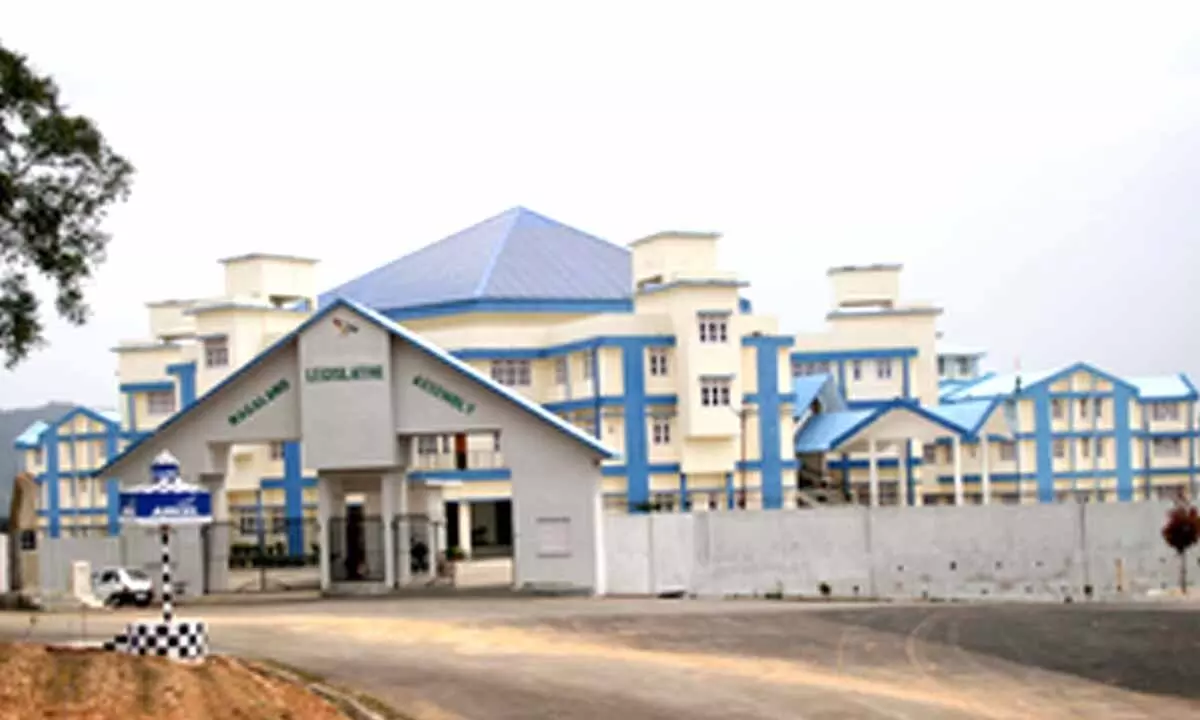Live
- ‘Game Changer’ team teases with a new promo
- Nara Lokesh emphasises overhaul of govt. schools and mid-day meal program
- Amid turmoil, air pollution peaks in Bangladesh as temperatures fall
- Google Trends unveils list of most searched ‘Indian Movies of 2024’
- BGT 2024-25: Hazlewood signals readiness for Brisbane Test after training with full run-up
- Google Presents Deep Research AI Tool for Comprehensive Web Reports
- Share of top 50 stocks to total market cap at all-time low: Report
- Nortje ruled out of SA’s remaining white-ball matches against Pakistan
- Mamata doesn't want INDIA bloc to succeed, claims BJP's Rahul Sinha
- Air India Express cancels flights at Chennai airport due to deluge
Just In
Nagaland Assembly passes Municipal Bill with 33% reservation for women

In a significant development, the Nagaland Assembly on Thursday passed the Nagaland Municipal Bill 2023 by voice vote with 33 per cent reservation for women.
Kohima: In a significant development, the Nagaland Assembly on Thursday passed the Nagaland Municipal Bill 2023 by voice vote with 33 per cent reservation for women.
The Bill was passed after the select committee headed by Deputy Chief Minister T.R. Zeliang presented the report on the Nagaland Municipal Bill in the House, recommending 33 per cent reservation for women.
Many powerful Naga organisations had earlier claimed that reservation for women in Urban Local Bodies (ULBs) would go against their community's customary laws.
In Nagaland, over 95 per cent of the land and its resources belong to the people and the community, while the government owns only about 5 per cent of the total area, including reserve forests, roads.
Chief Minister Neiphiu Rio, while participating in the discussion on the Bill, said that it was moved after threadbare consultation with civil society organisations and Naga tribal hohos.
He also said that provisions related to taxes, land and buildings have been excluded from the Nagaland Municipal Bill.
However, the provision for 33 per cent reservation for women in the ULBs has been retained as directed by the Supreme Court.
The provision for one-third reservation for women in the office of the chairperson in the ULB, which was there in the earlier Municipal Act, was also not included in the Nagaland Municipal Bill.
Rio said with regard to taxes, the elected body of a particular Municipality or Town Council would decide on tax or fees in their own jurisdiction.
The Chief Minister regretted the delay in reaching a consensus on ULBs, but sounded optimistic that the passage of the Nagaland Municipal Bill would lead to better administration, development, cleanliness, and beautification of cities and towns.
On his part, Zeliang expressed his happiness that the Bill includes 33 per cent reservation for women, which he believes will empower women to become elected representatives in the ULBs and contribute to the decision-making process for municipalities and towns.
The Deputy CM urged women to support the Bill and not let the reservation for the post of chairperson become a bottleneck in the implementation of ULB elections.
Earlier, the House withdrew the Nagaland Municipal Act 2001 by voice vote.
Certain provisions of the Nagaland Municipal Act 2001 had triggered severe objections by the influential Naga tribal hohos who claimed that the provisions infringed on Article 371(A).
It also led to violence, causing the death of two youths a few years back when the state government attempted to implement the provisions of the Municipal Act.
The consultative meeting of the state government with the apex tribal bodies and civil society organisations (CSO) held on September 1 had unanimously decided that the government would table the new Municipal Bill considering the customary laws and special constitutional provisions prevailing in Nagaland.
Municipal elections in Nagaland were first held in 2004, and the terms of the civic bodies ended in 2009-10.
The state government had tried to hold municipal elections with 33 per cent reservation for women, but the move was objected to by the influential CSOs and due to the opposition, no civic body election was held so far.
The state government, due to the pressure of the CSOs, Naga tribal hohos and various other organisations, repealed the Municipal Act in March and constituted a committee to draft a new law.
Article 371A grants special protection to the Nagas in Nagaland on traditional customary, religious and social practices and also on ownership and transfer of land and its resources.
The cultural, societal, traditional and religious practices, and land and resources in Nagaland are protected under Article 371A, which is also exempted from the 73rd Amendment to the Constitution for the setting up of municipalities.
But the 74th Amendment did not give that exemption on the ground that the state's urban administrations were not part of the customary practices.

© 2024 Hyderabad Media House Limited/The Hans India. All rights reserved. Powered by hocalwire.com






